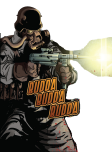
There's no telling who players will encounter in Fallout 76, or what their intentions will be, which is crucial to the game's tension and atmosphere
At the very least, you might imagine Bethesda would need NPCs to operate in-game stores. While Hines and Howard suggest players can essentially fashion themselves as shopkeepers or travelling merchants if they so choose, the developer can't rely on this - and the absence of trading players would scupper those in need of clearing their inventory.
Hines observes that technically it is never necessary to trade with an NPC in Fallout 4, or by extension any other Bethesda RPG. The firm's robust item system means players should be able to cope if no one sets up shop in their area of the map.
"Trading stuff is a pain in the ass," he says. "So [people] would use guns and weapons they found to break those down into the parts they needed to upgrade their own stuff and use the ammo that they find. You can do that.
"Nothing says you have to trade or else because that's taking choice out of your hands. I've now dictated a system that you can't live without, but what if that's not how you want to play? What if you want to be a loner who just lives off the land and builds the stuff that he needs? Uses the workshops he finds in the wasteland? That should all be viable."
Even with these tantalising prospects of an online role-playing experience unmired by overly aggressive players, there is still the sense that this is a title borne out of market trends rather than the natural evolution of the series. With all the major publishers channeling more and more effort into long-lasting, multiplayer-centric products, is the shift from single-player RPG to games-as-a-service inevitable?
"Industry wide, I have no idea," says Hines. "For us it will continue to be a mix. You heard Todd say the next adventure after 76 is Starfield, an epic single-player only game. They were like 'For this franchise [Fallout], this was an idea we had four years ago so we're gonna do it, but the next thing we're gonna do is be single-player'. Sure it might have some social features but it's not going to be a co-op multiplayer game. It's up to devs and what they want to do and what's a good fit."
Howard has
since told GamesIndustry.biz that Fallout 76 should in no way be seen as indicative of Bethesda shifting away from single-player content and towards online titles. In fact, Hines tells us this is partly what inspired the reveal of both Starfield and The Elder Scrolls VI.

The game is built around interacting with other people, but Bethesda assures there will plenty for lone players to enjoy
In previous years, Bethesda has used E3 to focus primarily on its short-term release slate, but by revealing these two titles, the publisher moved to assure fans that there will be plenty of single-player experiences for years to come.
"Me and my team felt that with the announcement of Fallout 76, it was important to give the context for where the studio is heading next," Hines explained. "Starfield had been sniffed out as a trademark filing and Todd already said we were doing TES 6. There's gonna be some amount of time between those because they're all big games with big development but that just felt better than announcing [Fallout 76] and then your first question is, 'does that mean you're done with single-player?' and I can't tell you, 'well actually, the next one is a big new single-player epic IP, but we're not talking about it' and I have to dance around it. Why not just tell them what we're doing?"
Given how little was shown of Starfield and Elder Scrolls VI - understandable for the latter, which is said to be in pre-alpha - most are assuming both titles are destined for next generation devices, although Hines indicates we may well see the sci-fi franchise before new consoles arrives.
"In the case of Starfield... it's already in development, it's playable," he says. "Todd had previously said that there is tools and tech he wanted for TES 6 that wasn't there yet. I think he was asked yesterday and he said some of the tech is there and some of it isn't, so I think it's a mix. There are some things he has now that he didn't have previously but maybe some things he wants the team to have to be able to do what they can't do yet."
Hopes are high for Fallout 76 following its E3 reveal, if only because it should be a significant shot in the arm for its publisher. Last year, Bethesda had a much busier line-up with Prey, Dishonored: Death of the Outsider, The Evil Within 2 and Wolfenstein II - but none seemed to set the market alight at launch, especially compared to Fallout and The Elder Scrolls
"Yeah but lots of things don't sell as well as Fallout and Elder Scrolls," Hines reasons. "Our belief is that we want to aim for the right goal of what we're making and what those franchises can do. If you hold up every game as if it's gotta do what Fallout and Skyrim did, then you're [not] gonna make many games because very few games will do that. Like, Doom didn't do that but Doom still sold awesome, so it's just about what's the right size dev team, dev cycle, size of the audience and are we doing a good job of delivering that.
He concludes: "In general I always want everything to do more than it did. If we sold eight I wouldn't have minded nine, if we sold 20 I don't mind 21. There's never a point as publisher or developer where you say we literally should stop selling copies of this. You always want more players, you wanna do better. I think we had some things that did well, I think we had things that we thought might sell better but it is what it is."
































![Glory to Codexia! [2012] Codex 2012](/forums/smiles/campaign_tags/campaign_slushfund2012.png)








